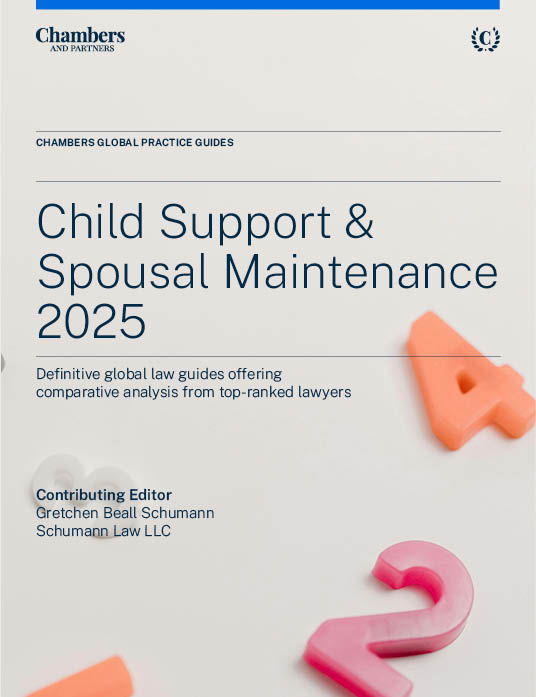
Child Support & Spousal Maintenance 2025
The new Child Support & Spousal Maintenance 2025 guide provides the latest legal information and up-to-date commentary on developments around questions of parentage, the calculation and duration of child support and spousal maintenance, enforcement and remedies (including the role of administrative agencies), modification of support/maintenance orders, and the recognition and enforcement of foreign orders.
Last Updated: September 03, 2025
Compare law and practice by selecting locations and topic(s)
Select Locations

Select Topic(s)

Please select at least one location and one topic to use the compare functionality.
In a world where global relocation is becoming the norm, cross-border child and spousal support matters may be fraught with complexities. Information is key to understanding not only how different jurisdictions determine child and spousal support awards but whether foreign orders can be enforced or modified under a like, or vastly dissimilar, legal system – and in that instance, under what circumstances and pursuant to which jurisdiction’s law.
When practitioners can anticipate a client’s move to another jurisdiction, they should assess whether there needs to be an element of pre-planning contained within their foreign agreement or order provisions. This Guide is developed with an aim to strengthen counsel’s advice and to support best practices, as well as to assist counsel in securing foreign advice sooner rather than later, thus avoiding language ambiguities and unnecessary – and potentially costly – enforcement or modification litigation down the road. As the adage goes, “hindsight is 20/20”, so foresight plays a critical part in ensuring that clients’ future needs are met.
This Guide will explore in detail, from A to Z, how each jurisdiction within the Guide approaches initial proceedings for child and spousal support. For example, must the parties establish parentage, and may third parties seek child support? With respect to child and spousal support, does the court adopt a formulaic approach or look to other factors, or does the jurisdiction apply a hybrid approach? How does the determination of spousal support differ from a determination of child support?
How does each jurisdiction assess the financial resources available to provide for a child or spouse? What type of cash and non-cash support or benefits may be ordered, and are obligors responsible for paying for direct expenses such as education, childcare, healthcare, insurance or other needs? Does the court make both temporary and permanent orders?
It is also critical for practitioners to understand how the durational aspects of support will impact clients. In some jurisdictions, child support may be paid until the age of 21, and in many the funding ceases at the age of 18 and/or does not include college or university costs. Certain jurisdictions may provide for even later child support based on a child’s developmental disabilities or other considerations. Similarly, spousal support durational guidelines exist in some jurisdictions, but in others length of payment may be considerably more discretionary and somewhat inconsistent.
Another important aspect of any support order is the security provided if the payor does not survive the length of the obligation. This Guide seeks to compare the ways in which varying jurisdictions require clients to make provisions for their spouse or child in the case of life’s unexpected events.
Of great importance is an understanding of the court process itself, including the standards for financial disclosure expected of litigants, which may range from a minimal to an in-depth exploration of one’s finances involving sworn statements, testimony, subpoenaed records, vocational reports and other discovery mechanisms.
In some jurisdictions, administrative agencies may play a pivotal role in establishing and enforcing orders. This Guide explores the reach of such administrative authority and whether these administrative measures limit or vitiate the court’s role.
Jurisdictional questions are also touched upon in this Guide, such as when a court may enforce or modify a foreign order and the steps that must be taken to domesticate a foreign judgment so as to have force within each author’s jurisdiction. In the United States, each state has adopted a uniform law (Uniform Interstate Family Support Act, or UIFSA) that sets forth the jurisdictional bases to enforce or modify a prior order initiating from another state – this same law also applies to foreign judgments issued in jurisdictions with substantially similar laws or where there are reciprocal agreements. A primary theme running between multiple jurisdictions is that recognition and enforceability of a foreign order may hinge on due process and adherence to certain public policies.
Vital to any analysis is an understanding of the legal standard in a given jurisdiction for modification of any foreign spousal or child support order. This Guide seeks to emphasise the considerations that will be taken if such a spousal or child order is to be modified by the court, and which law will be applied to the outcome in the absence of an enforceable choice-of-law clause. This Guide further speaks as to whether contracts, such as nuptial agreements or matrimonial settlement agreements, are given particular weight in respect of a court’s consideration of whether to uphold the contractual spousal or child support arrangement.
Enforcement proceedings may have different bases for jurisdiction than modification proceedings, with penalties spanning a wide spectrum including money judgments, restraints and freeze orders against assets, wage garnishments, licence revocations and, in more severe cases, imprisonment. Practitioners must arm themselves with information about how such consequences may affect a client’s international travel, employment or immigration status.
Lastly, several jurisdictions may provide for ancillary relief related to the manner in which the parties bear the burden of the costs of support proceedings, including which party may be more or less responsible for counsel and/or expert fees. In an enforcement proceeding, an obligor who has violated a child support or spousal support agreement may also be ordered to pay costs as a remedial measure, even if this is the non-monied party.
In summary, along with the contributions of my esteemed colleagues, I am honoured to present the following in-depth study of the ways in which the authors’ jurisdictions approach questions of family support, leaving the global practitioner with a more nuanced understanding of support outcomes impacting cross-border clients.
